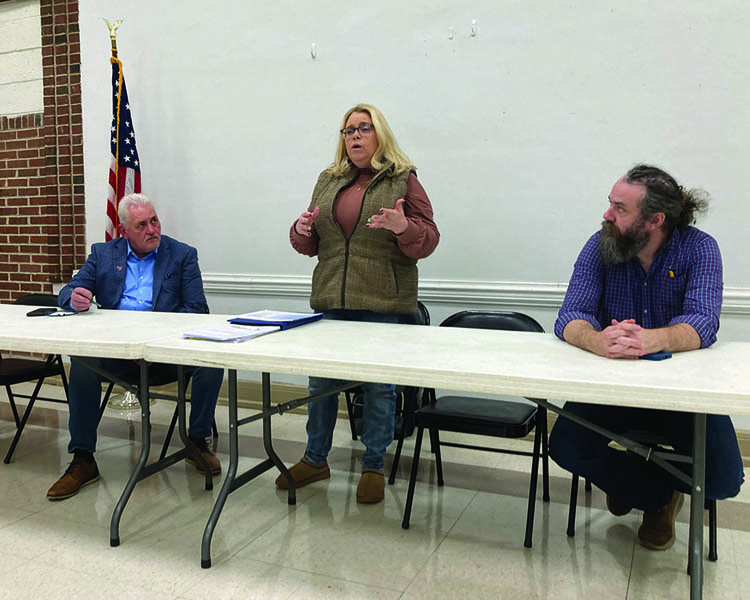Nonprofit organizations share ideas for opioid funds

The members of the Opioid Settlement Task Force are Tim Isbel, Shelly Vandagriff and Joshua Anderson. (photo:Ben Pounds )
The Opioid Settlement Committee, made up of three Anderson County commissioners, led a meeting at the Clinton Community Center Feb. 29, open to the public, to discuss ways to use the funds to help people harmed by the opioid crisis.
Leaders from four nonprofits gave examples of some of their programs the funds could help.
The money has come from lawsuits against drug companies including Purdue Pharma, Merc and Allergen, and against distributors like Walmart, Food City and Walgreens.
Katie Hull, director of nursing, spoke about her organization Free Medical Clinic’s new behavioral health and other services that opioid addicts might use.
Shayla Wilson, executive director of Allies for Substance Abuse Prevention of Anderson County, spoke about disposal boxes as a way to drop off drugs, preventing people from taking them when not needed.
The Boys and Girls Club’s Hannah Harned, regional service director, and Matthew Queener, area director for Clinton, spoke about their organization’s social workers helping children whose parents might have addiction issues.
Mitch Daugherty talked about Celebrate Recovery and its 12-step programs for addiction. It meets at Main Street Baptist Church in Rocky Top, but does not rely on the church’s budget.
Members of the Opioid Task Force are commissioners Shelly Vandagriff, Tim Isbel and Joshua Anderson.
Any funding will also need to pass the Budget Committee and full County Commission first.
The county has about $650,000 in the fund, Vandagriff said. However, she said more funds will continue to come in from various sources.
At its Feb. 22 meeting, the County Commission voted to approve additional funds from a national opioid settlement with Walmart, Walgreens, CVS, Allergan, and Teva totaling $207,216.
The county also recently voted to approve a bankruptcy agreement with the company Endo, which will also go to the Opioid Task Force’s fund.
The meeting was the second such listening event after an earlier one in Rocky Top.
Vandagriff said the earlier one had fewer nonprofits represented, but still had citizens expressing opinions, including the need for help with homelessness, residential treatment, and transportation to recovery programs.
She said the committee plans to hold a meeting in Oak Ridge, but hadn’t set a date or time.
“We want the communities to come out and let us know what they feel the issues are,” she said.
During the most-recent meeting, Vandagriff listed many possibilities.
Some of the funds, she said, may go to direct methods to deal with the issues of people who overdose, like ambulances and the drug NARCAN.
The money can also fund things like support for people suffering from addiction, such as housing, transportation and medical services.
Other possibilities are funding for data collection, treatment and recovery programs, and help for families.
Vandagriff’s tie to the issue is personal. She said her sister had issues with drug addiction and ended up homeless in Knoxville before entering an abusive relationship. Her partner choked her to death during an argument regarding drugs.
“I have experience with drug use and specifically opioid use, and how it has affected her and her children, and my mother and father, my brothers, my sisters. How we’ve all been impacted by that,” Vandagriff said.
The nonprofit representatives were eager to explain more about their programs.
“We just offer a judgment free zone,” said Daugherty about Celebrate Recovery. “We encourage people. We give them tools when they need them and we’re always there for them. I’m kind of passionate about it.”
“The Clinton box is typically full, most frequent out of any of the [drop-off] boxes in our service,” Wilson said, adding that she’d like to add other boxes not just for Clinton but for small communities as well. She also suggested personal lockboxes at home.
Hull said the Free Medical Clinic’s behavioral health services, which can help people struggling with addiction, can complement their group’s primary and specialty care for people without insurance.
“Someone who is uninsured and going through opioid addiction needing treatment for it is also going to need the other services that we provide,” she said, adding that she would also like to partner with other groups handling opioid issues.
Hannah said Boys & Girls Clubs serve more than 300 children in the county. She talked about helping children from families with addiction and her group’s efforts in general.
“If we can provide a holistic wrap-around service, our program does,” she said. The organization’s social workers can provide referrals to other nonprofits that can support the families.
She said 17% of the children the group assists in Anderson County live with a non-relative caregiver. She hadn’t looked at how frequently that had to do with addiction or mental illness but said those were likely causes.
She said she would like to run evidence-based programs around prevention and mental health regarding opioids.


